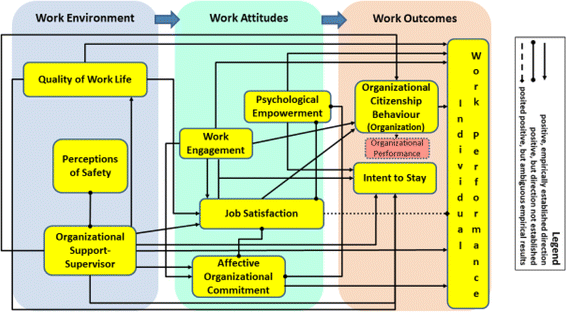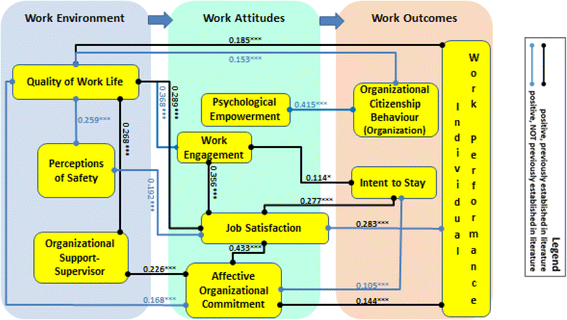Relationships between work outcomes, work attitudes and work environments of health support workers in Ontario long-term care and home and community care settings
- PMID: 29566723
- PMCID: PMC5863810
- DOI: 10.1186/s12960-018-0277-9
Relationships between work outcomes, work attitudes and work environments of health support workers in Ontario long-term care and home and community care settings
Abstract
Background: Our overarching study objective is to further our understanding of the work psychology of Health Support Workers (HSWs) in long-term care and home and community care settings in Ontario, Canada. Specifically, we seek novel insights about the relationships among aspects of these workers' work environments, their work attitudes, and work outcomes in the interests of informing the development of human resource programs to enhance elder care.
Methods: We conducted a path analysis of data collected via a survey administered to a convenience sample of Ontario HSWs engaged in the delivery of elder care over July-August 2015.
Results: HSWs' work outcomes, including intent to stay, organizational citizenship behaviors, and performance, are directly and significantly related to their work attitudes, including job satisfaction, work engagement, and affective organizational commitment. These in turn are related to how HSWs perceive their work environments including their quality of work life (QWL), their perceptions of supervisor support, and their perceptions of workplace safety.
Conclusions: HSWs' work environments are within the power of managers to modify. Our analysis suggests that QWL, perceptions of supervisor support, and perceptions of workplace safety present particularly promising means by which to influence HSWs' work attitudes and work outcomes. Furthermore, even modest changes to some aspects of the work environment stand to precipitate a cascade of positive effects on work outcomes through work attitudes.
Keywords: Elder care; Health support workers; Health workforce psychology; Home and community care; Job satisfaction; Long term care; Perceived organizational support; Work attitudes; Work environment; Work outcomes; Work psychology.
Conflict of interest statement
Ethics approval and consent to participate
The research project of which this manuscript is part has been approved by the University of Toronto’s Human Research Ethics Program Protocol Reference 30742.
Consent for publication
Not applicable.
Competing interests
The authors declare that they have no competing interests.
Publisher’s Note
Springer Nature remains neutral with regard to jurisdictional claims in published maps and institutional affiliations.
Figures
References
-
- Faul AC, Schapmire TJ, D’Ambrosio J, Feaster D, Oak CS, Farley A. Promoting sustainability in frontline home care aides: understanding factors affecting job retention in the home care workforce. Home Health Care Manage Pract. 2010;22(6):408–416.
-
- Boris E, Klein J. Organizing home care: low-waged workers in the welfare state. Politics & Society. 2006;34(1):81–108.
-
- Castle N. Nursing home caregiver staffing levels and quality of care: a literature review. J Appl Gerontol. 2008;27(4):375–405.
-
- Health Professions Regulatory Advisory Council. 2006. Regulation of health professional in Ontario: new directions. Toronto: Author. Retrieved from http://www.hprac.org/en/reports/resources/new_directions_april_2006_en.pdf.
-
- Lum J, Sladek J, Ying A. Ontario personal support workers in home and community care: CRNCC/PSNO survey results. Canadian Research Network for Care in the Community. 2010. https://www.ryerson.ca/content/dam/crncc/knowledge/infocus/factsheets/In....
Publication types
MeSH terms
Grants and funding
LinkOut - more resources
Full Text Sources
Other Literature Sources
Medical



